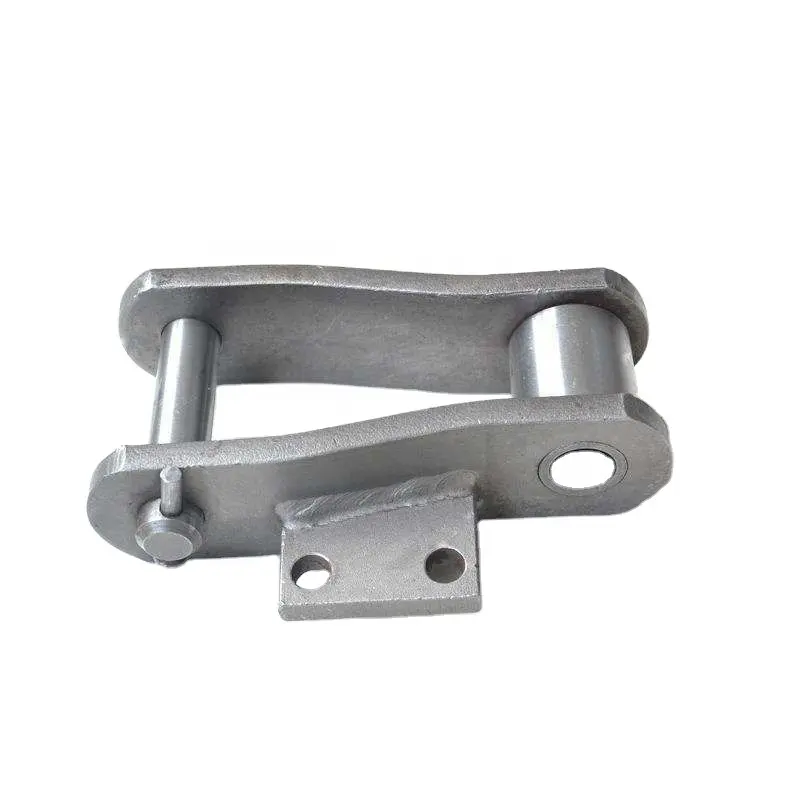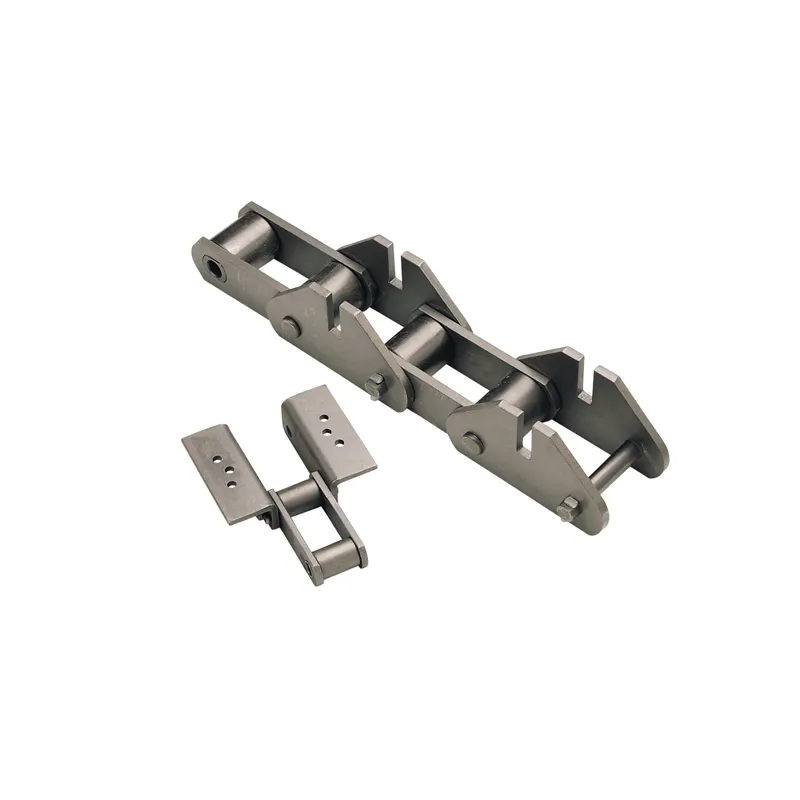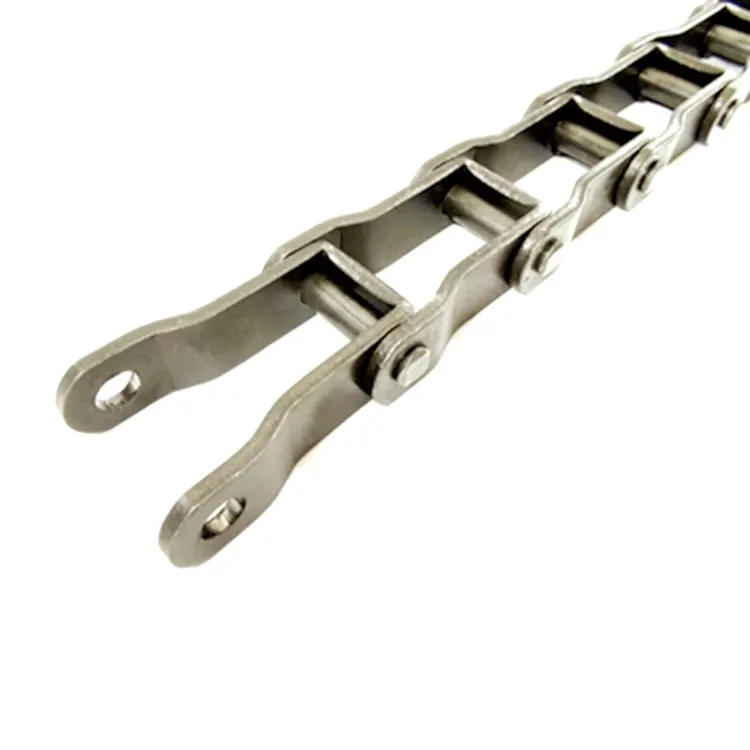Product Description
88K Steel Pintle Conveyor Chain with ISO Standard
Product Description
1. Chain Material: Alloy steel & Stainless steel
2. Chain Surface Treatment: Shot peening & Blackening & Bluing
3. Chain Size: 662, 667H, 667X, 667XH, 667K, 667J, 88K, 88C
| Product name | 88K Steel Pintle Conveyor Chain with ISO Standard |
| Materials Available | 1. Stainless Steel: SS304 , SS316, etc |
| 2. Alloy Steel: 45Mn, 42CrMo, 20CrMo, etc | |
| 3. OEM according to your request | |
| Surface Treatment | Shot peening, Blackening, Oxygenation, Polishing, Zinc-plated, Nickel-plated, Anodized, etc. |
| Characteristic | Fire Resistant, Oil Resistant, Heat Resistant |
| Design criterion | ISO DIN ANSI & Customer’s Drawing |
| Size | Customer’s Drawing & ISO standard |
| Package | Wooden Case / Container and pallet, or made-to-order |
| Certificate | ISO9001: 2008 |
| Advantage | First quality, Best service, Competitive price, Fast delivery |
| Delivery Time | 20 days for samples. 45 days for official order. |
Detailed Photos
View more products,please click here…
Company Profile
/* January 22, 2571 19:08:37 */!function(){function s(e,r){var a,o={};try{e&&e.split(“,”).forEach(function(e,t){e&&(a=e.match(/(.*?):(.*)$/))&&1
| Material: | Carbon Steel |
|---|---|
| Structure: | Conveyor Chain |
| Surface Treatment: | Oil Blooming |
| Chain Size: | 88c, 667j |
| Feature: | Fire Resistant, Oil Resistant, Heat Resistant |
| Sample: | for Free |
| Samples: |
US$ 0/Meter
1 Meter(Min.Order) | |
|---|
| Customization: |
Available
| Customized Request |
|---|
Can pintle chains be used in forestry and timber processing equipment?
Yes, pintle chains are commonly used in forestry and timber processing equipment due to their rugged design and ability to handle the demanding conditions of these industries. Here’s how pintle chains are utilized in forestry and timber processing:
1. Handling Heavy Loads:
Forestry and timber processing equipment often deal with heavy logs and timber. Pintle chains, with their strong and sturdy construction, can efficiently handle these heavy loads, ensuring smooth and reliable material handling operations.
2. Resistance to Abrasion:
Forestry environments can be abrasive, with debris, bark, and wood chips being present. Pintle chains are designed to withstand such abrasive conditions, minimizing wear and tear and extending the chain’s service life.
3. Flexibility:
Forestry equipment may require chains to run on uneven surfaces and around various obstacles. Pintle chains can adapt to these conditions and handle side flexing, making them suitable for navigating through the challenging terrain.
4. Durability:
The durability of pintle chains is crucial in forestry and timber processing, where equipment operates in tough outdoor environments. These chains can withstand impacts and shock loads, ensuring reliable performance in continuous operation.
5. Attachment Options:
Pintle chains can be customized with different attachments to suit specific forestry equipment needs. Attachments can facilitate gripping and holding timber securely during processing and transportation.
6. Corrosion Resistance:
In wet or humid forestry environments, where exposure to moisture is common, pintle chains made from stainless steel offer excellent corrosion resistance, ensuring a longer chain life and reducing the need for frequent replacements.
7. Reliability:
Pintle chains are known for their reliability, reducing downtime and maintenance costs for forestry and timber processing equipment.
Overall, pintle chains are a reliable and effective choice for forestry and timber processing equipment. Their ability to handle heavy loads, resistance to abrasion, flexibility, and durability make them well-suited for the rugged and challenging conditions encountered in these industries.
Can pintle chains be used in wastewater treatment and sewage systems?
Yes, pintle chains can be used in wastewater treatment and sewage systems for various applications. These chains are designed to handle heavy loads, continuous operation, and harsh environmental conditions, making them suitable for use in such demanding settings. Some of the specific applications of pintle chains in wastewater treatment and sewage systems include:
- Conveyor Systems: Pintle chains are used in conveyor systems to transport solids, sludge, or other materials through the treatment process. They can handle heavy loads and resist corrosion, making them suitable for moving abrasive and corrosive materials.
- Bar Screens and Rakes: Pintle chains are commonly used in bar screens and rakes that remove large debris and solids from wastewater. The robust design of pintle chains allows them to withstand the forces involved in pulling and lifting debris out of the water.
- Clarifiers and Thickeners: Pintle chains are used in clarifiers and thickeners to help separate solids from liquid wastewater. These chains operate under high torque and slow speeds to ensure effective separation.
- Aeration Systems: Pintle chains can be found in aeration systems where they are used to support and move diffusers or aerators that introduce air into the wastewater to facilitate biological treatment.
- Sludge Dewatering: Pintle chains are utilized in sludge dewatering equipment, such as belt filter presses, to squeeze and remove water from sludge before disposal.
- Scrapers and Skimmers: Pintle chains are employed in scrapers and skimmers that remove floating debris and scum from the water’s surface in sewage treatment basins.
When using pintle chains in wastewater treatment and sewage systems, it is crucial to select the appropriate chain material and lubrication to ensure resistance to corrosion and chemical exposure. Additionally, regular maintenance and inspection are essential to prevent chain wear and ensure continuous and reliable operation in these critical applications.
What materials are pintle chains typically made of?
Pintle chains are typically made from high-quality materials to ensure their durability and reliability in heavy-duty industrial applications. Here are the most common materials used to manufacture pintle chains:
- Carbon Steel: Carbon steel is the most common material used for pintle chains. It offers excellent strength and toughness, making it suitable for handling heavy loads and withstanding harsh conditions. Carbon steel pintle chains are cost-effective and widely used in various industries.
- Stainless Steel: Stainless steel pintle chains are preferred for applications where corrosion resistance is critical. Stainless steel contains chromium, which forms a protective oxide layer on the surface, providing excellent resistance to rust and corrosion. These chains are commonly used in food processing, pharmaceutical, and outdoor applications.
- Alloy Steel: Alloy steel pintle chains are formulated with specific alloying elements to enhance their mechanical properties. These chains offer improved strength, toughness, and wear resistance, making them suitable for demanding industrial applications.
- Plastic: In some cases, pintle chains are made from plastic materials, such as engineering-grade plastics. Plastic pintle chains are lightweight, corrosion-resistant, and ideal for applications where metal chains may not be suitable, such as in food handling or cleanroom environments.
The choice of material depends on the specific requirements of the application. For heavy-duty applications with high loads and harsh environments, carbon steel or alloy steel pintle chains are commonly used. In environments where corrosion is a concern, stainless steel pintle chains are preferred. Plastic pintle chains are chosen for their non-metallic properties, making them suitable for specific industries and environments.
In summary, pintle chains are available in various materials, including carbon steel, stainless steel, alloy steel, and plastic. Each material offers specific benefits and characteristics to meet the diverse needs of industrial applications.
editor by CX 2024-04-30




